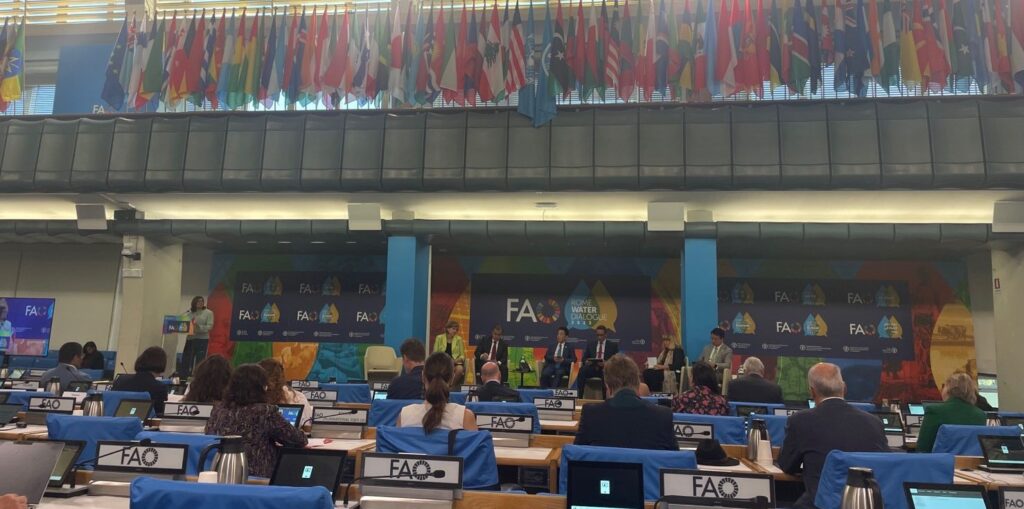World Food Day: Without Water, There’s No Food
Water takes centre stage on this World Food Day, whose theme is ‘Water is life, water is food. Leave no one behind.’ The 2023 campaign, led by the Food and Agriculture Organization (FAO) of the United Nations, underscores the pivotal role water plays in securing our food supply. At the recent FAO Rome Water Dialogue, attended by various institutions, delegates, and speakers from around the world, there was a unanimous agreement that this is truly the year of water.
The UN Water Conference held in New York this March, the first of its kind in half a century, marked a turning point in recognising water as a critical issue deserving our immediate attention. From the sessions that I have attended in Rome, it’s become clear that addressing water issues within the confines of the water sector is inadequate. Water knows no boundaries, and is a cross-cutting issue affecting many, if not all, sectors. Food production is indeed one of the sectors most affected by water, and by climate change. A staggering 72% of global freshwater withdrawals are attributed to agriculture, with 16% allocated to municipalities for households and services, and 12% used by industries.
FAO Director-General QU Dongyu emphasised the interconnectedness of water, energy, and food as crucial themes leading up to COP 28 later this year in Dubai. Water emerges as a key connector to address these pressing challenges. Climate change, as highlighted by the speakers, has severely disrupted the water cycle, resulting in a surge of extreme weather events, many of which are witnessed around the world, from the recent floods in India to New York. It is often farming and agriculture that bear the most profound impact from extreme water events.
While there are plenty of solutions nowadays, they often remain fragmented and sector-specific. Innovative projects and approaches are emerging to bridge this gap. One of the most interesting takeaways from the Rome Water Dialogue was the ecosystem-based approach, which is a strategy for integrated water management of land, water, and more. Coupled with Nature-based Solutions (NbS), the ecosystem-based approach can be a lifesaver for the benefit of people and nature. Institutions are now calling on governments to design science- and evidence-based policies that harness data and innovation and coordinate across sectors to plan and manage water better. The International Water Association (IWA) and the Nature Conservancy (TNC), for example, have a Memorandum of Understanding to work on NbS mainstreaming in water infrastructure, planning, spending and management among utilities and regulators worldwide. The importance of regulation and governance was also widely discussed and is gaining momentum worldwide as a means to achieve the SDGs. IWA will be hosting the 8th International Water Regulators Forum in Kigali this December, with the purpose of contextualising water and sanitation regulation in different settings.
Water, energy, and food are inextricably linked, and for policies to be successful, it’s important that they manage often competing interests without compromising the health of our ecosystems. A very useful tool for governments and policymakers to take concrete action is through the National Water Roadmaps. The UN is closely working with governments and communities to build country-owned and country-led National Water Roadmaps to strengthen intersectoral coordination of water at the national level. It also builds the datasets and technology they need to make well-informed decisions.
Another key aspect that was touched on is the integration of water within the Kunming-Montreal Global Biodiversity Framework (GBF). For example, NGOs and other actors are now implementing measures to empower farmers and indigenous peoples to become agents of water management and be equipped with the right tools to do so sustainably while protecting biodiversity. Managing water starts by selecting and using the right biodiversity in production systems.
Water is not only a resource. Water is food and life itself. It supports all life forms on the planet and therefore it’s crucial to protect and preserve water for a thriving planet. We all need to stop taking water for granted. Making informed decisions about what we consume, wasting less water and food, and preventing pollution are easy things that all of us can do to contribute to positive #WaterAction for a brighter future for food, people, and the planet.
Nature-based Solutions, climate resilience and the circular economy of water are all key topics that will be discussed at the upcoming IWA Water and Development Congress & Exhibition in Kigali, Rwanda, on 10-14 December. Join this crucial gathering of water and development experts who will convene to find relevant solutions tailored for low- and middle-income countries. Registration is open.



